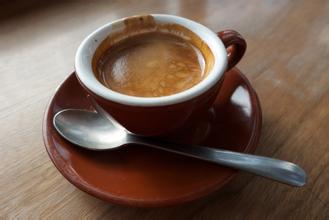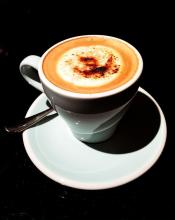Jamaican Coffee producing area Manor introduces Cliff Manor Jamaican Coffee varieties
However, by 1948, the quality of coffee had declined and Canadian buyers refused to renew their contracts, so the Government of Jamaica established the Coffee Industry Committee to save the fate of top coffee, and by 1969 the situation had improved. because the use of Japanese loans to improve the quality of production, thereby ensuring the market. Even in 1969, Japanese coffee drinkers were willing to insure the coffee. By now, this kind of coffee has reached the point of being feverishly loved.
By 1981, about 1500 hectares of land in Jamaica had been reclaimed for coffee cultivation, followed by investment in another 6000 hectares of coffee land. In fact, today's Blue Mountain area is a small area with a planting area of only 6000 hectares, and it is impossible to grow all the coffee marked "Blue Mountain" there. Another 12000 hectares of land is used to grow two other types of coffee (non-Blue Mountain Coffee): Alpine Top Coffee (High Monuntain Supreme) and Jamaican Premium Coffee (Prime Washed Jamaican).
Blue Mountain Coffee is one of the most advantageous coffee growing conditions in the world. Jamaica's weather, geological structure and topography provide a unique ideal place. The ridge that runs through Jamaica extends to the eastern part of the island, with the Blue Mountains rising to more than 2100 meters. Cool weather, foggy, frequent precipitation, use this rich soil Rain Water to reconcile. Here, a mixed planting method is used to grow coffee trees to accompany banana trees and avocado trees on terraces.
Some small estates also grow Blue Mountain Coffee, such as Wallenford Estarte, Silver Hill Eatate, and J. Martinez) Atlanta Manor (Atlantn Estate), etc. Even the largest landowners in the region are small-scale growers by international standards, many of whom are small landowners whose families have been working on the land for two centuries. The coffee industry in Jamaica faces a series of problems, such as the impact of hurricanes, increased labor costs and difficult mechanization of terraces. It is difficult to rationalize planting on many small estates and farms.
Jamaican Blue Mountain Coffee, however, Blue Mountain Coffee is a coffee that coffee retailers that value credibility need to stock up anyway. The major retailer in the UK said: no matter what the price, he will continue to sell Blue Mountain coffee all year round because he has many customers who only recognize "Blue Mountain".
As Japan has always invested in the Jamaican coffee industry, the cultivation of Blue Mountain Coffee is now mostly controlled by the Japanese, and there is no doubt that they have also won the right of priority to buy Blue Mountain Coffee. In 1992, Jamaica sold 688 tons of Blue Mountain coffee to Japan, 75 tons to the United States and 59 tons to Britain. Now, 90% of the harvested Blue Mountain coffee is bought by the Japanese. Now that the rest of the world can only get 10% of Blue Mountain, Blue Mountain coffee is always in short supply, regardless of the price. In the UK, Langford Brothers Brothers has been the only supplier for many years. Later, the Edmunds Group (Edmonds Group) also received a supply from Jamaica's Salda Food Company (Salda Foods).

Important Notice :
前街咖啡 FrontStreet Coffee has moved to new addredd:
FrontStreet Coffee Address: 315,Donghua East Road,GuangZhou
Tel:020 38364473
- Prev

Jamaica Coffee Manor with full grains introduce Silver Mountain Manor Jamaica Coffee producing area
The best Blue Mountain Coffee is undoubtedly one of the best. Although the price can ensure an adequate supply of Blue Mountain coffee, it does not guarantee the best flavor of the coffee. Also, this kind of coffee tastes much more expensive than it looks. If you want to taste its best flavor, you should put more coffee beans than other coffee, otherwise the flavor will be a little different, so the flavor is reflected in
- Next

Taste of Nicaraguan Coffee introduce Joy Manor Nicaraguan Coffee area
Dry aromas are full of chocolate, with aromas of hazelnut and cocoa. The wet aroma also has the smell of chocolate, accompanied by the smell of orange peel. With the baking degree of city+, the bright lemon acid and long cocoa finish are wonderful. Dry aroma (1-5): 3.8 wet aroma (1-5): 3.8 acidity (brightness) (1-10): 8.9 taste (layered) (1
Related
- Does Rose Summer choose Blue, Green or Red? Detailed explanation of Rose Summer Coffee plots and Classification in Panamanian Jade Manor
- What is the difference between the origin, producing area, processing plant, cooperative and manor of coffee beans?
- How fine does the espresso powder fit? how to grind the espresso?
- Sca coffee roasting degree color card coffee roasting degree 8 roasting color values what do you mean?
- The practice of lattes: how to make lattes at home
- Introduction to Indonesian Fine Coffee beans-- Java Coffee producing area of Indonesian Arabica Coffee
- How much will the flavor of light and medium roasted rose summer be expressed? What baking level is rose summer suitable for?
- Introduction to the characteristics of washing, sun-drying or wet-planing coffee commonly used in Mantenin, Indonesia
- Price characteristics of Arabica Coffee Bean Starbucks introduction to Manning Coffee Bean Taste producing area Variety Manor
- What is the authentic Yega flavor? What are the flavor characteristics of the really excellent Yejasuffi coffee beans?

